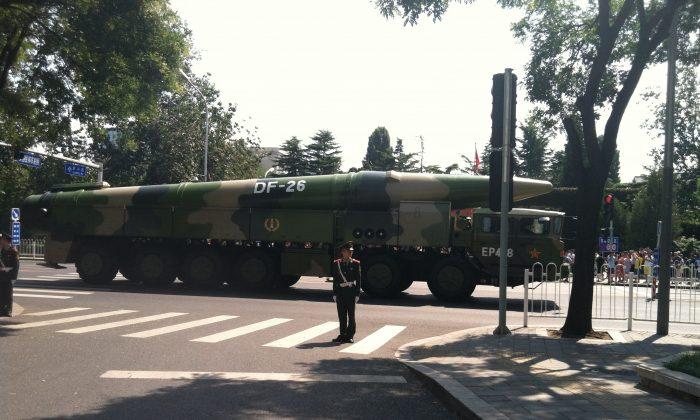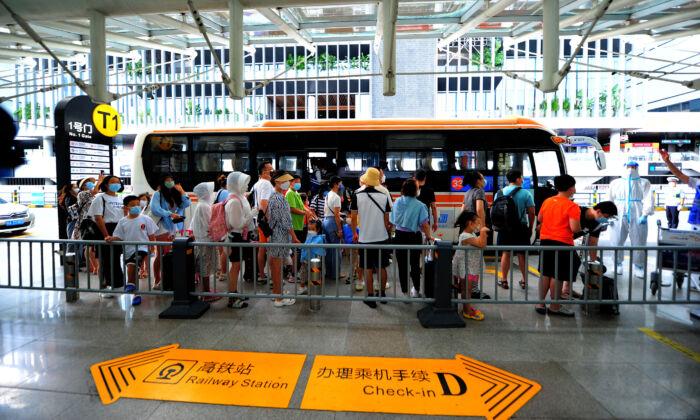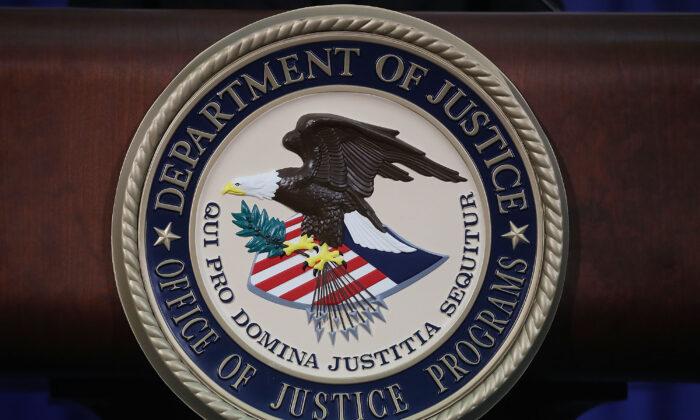Many Chinese media reports are amping up their criticism of Washington, now that the Trump administration says it intends to pull out of the Intermediate-Range Nuclear Forces (INF) treaty that was signed during the Cold War.
The U.S. government, which is currently holding discussions with the Kremlin about terminating the INF treaty, says that aside from the fact that Russia has been a violator, the agreement did nothing to check the growing nuclear capabilities of the Chinese communist regime. China, which wasn’t party to the INF, deploys large numbers of intermediate-range ballistic missiles (IRBM).
On Oct. 20, President Donald Trump told reporters that Russia has “been violating [the INF treaty] for many years.”
“Unless Russia comes to us and China comes to us and they all come to us and say, ‘Let’s really get smart and let’s none of us develop those weapons.’ But if Russia’s doing it and if China’s doing it and we’re adhering to the agreement, that’s unacceptable,” the president said
Chinese state-run media, such as Xinhua and Global Times, as well as media aligned with the Chinese Communist Party (CCP), such as Hong Kong’s Phoenix News, reacted strongly to Trump’s statements. Many articles repeated the mantra that scrapping the treaty would be opening a “door to hell.”
On Oct. 22, Chinese foreign affairs spokeswoman Hua Chunying said at a regular press conference that “it is completely wrong to bring up China when talking about withdrawal from the treaty.” On Oct. 23, she accused the United States of “unreasonably” and “unacceptably” using China as an excuse to end the treaty, and of putting the onus on Beijing.
The INF, signed by then-U.S. President Ronald Reagan and Soviet leader Mikhail Gorbachev in 1987, was intended to reduce tensions in Europe, which, at the time, was divided into communist and non-communist camps. The pact eliminated thousands of intermediate-range ballistic missiles (IRBMs) from the arsenals of both superpowers.
Both countries agreed to stop the production, testing, and deployment of any new cruise and ballistic missiles with ranges between 500 kilometers (310 miles) and 5,500 kilometers (3,418 miles).
The United States has complained about Russia’s past violations of the INF treaty, including in 2014, when the Russian military deployed its nuclear-armed 9M729/SSC-8 cruise missiles, which have a range of about 2,000 kilometers (1,243 miles).
Meanwhile, unbound by the treaty, China has built up its nuclear arsenal. While China claims to possess only a few hundred warheads, international observers estimate that the true size could be in the thousands, putting it on par with the United States and Russia.
There has been growing pressure on China to join the agreement, especially following revelations in recent years of a subterranean “nuclear great wall,” consisting of tunnels able to hide as many as 3,600 nuclear missiles.
China’s Rocket Forces field a number of IRBMs and intercontinental ballistic missiles (ICBM)s. This year, the Rocket Forces deployed the Dong Feng-26 IRBM, which has a range of 3,000 to 4,000 km (1,864–2,485 miles) and equips nuclear warheads. The DF-26 can reach critical U.S. military installations on Guam, which is part of the U.S. military’s so-called second island chain in the Pacific. That has earned the missile the moniker of “Guam Killer” or “Guam Express.”





